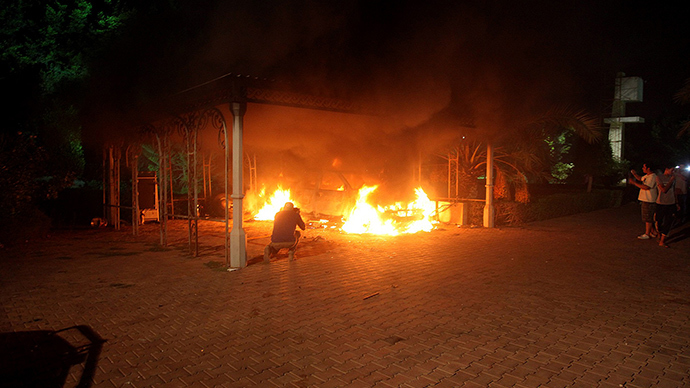United States officials reportedly captured a militant accused of orchestrating the September 11, 2012 terrorist attack in Benghazi, Libya that left four Americans dead.
The Washington Post first reported Tuesday morning that US Special Operation forces captured the man, Ahmed Abu Khattala, after months of coordination with agents at the Federal Bureau of Investigation.
Khattala, who is labeled by the Post as “one of the suspected ringleaders” of the 2012 event that killed US Ambassador Chris Stevens and three others, was reportedly apprehended during a secret raid that occurred over the weekend in Libya, but journalists at the paper agreed to postpone publication until Tuesday due to security concerns.
The operation that led to Khattala’s capture was a success, US officials told the Post, and all American personnel have since left the north Africa nation. Khattala is the first suspect thought responsible for the attack to be apprehended by authorities, albeit nearly two months after the attack, and will reportedly be arraigned in Washington, DC. Investigators first confirmed to NBC News last August that Khattala had been charged under seal.
Officials have neglected to provide further information about Khattala's status, but Reuters reported shortly after news broke on Tuesday that the suspect was being held on a US ship, according to one official. In the past, terrorist suspects have been confined to such facilities and interrogated off US soil before being brought to the States.
"The fact that (Khatallah) is now in US custody is a testament to the painstaking efforts of our military, law enforcement and intelligence personnel. Because of their courage and professionalism, this individual will now face the full weight of the American justice system," the White House said in a statement later in the day.
According to the Post, one senior official who confirmed news of this weekend’s raid called the event “a reminder that when the United States says it’s going to hold someone accountable and he will face justice, this is what we mean.”
“We have made clear to successive Libyan governments our intention to bring to justice the perpetrators of the attack on our facilities in Benghazi,” one official added to the paper. “So it should come as no surprise to the Libyan government that we would take advantage of an opportunity to bring Abu Khatalla to face justice.”
Two CIA contractors and a State Dept. security official died as a result of the Sept. 2012 incident, which occurred at an American consulate building in Benghazi on the 11-year anniversary of the 9/11 terrorist attacks.
The US State Department has since January called Khattala a “senior leader” of a Benghazi affiliate of Ansar Al-Sharia, a militant organization that has been designated a terrorist organization by American officials.
Although Khattala has only been linked to that group by the State Dept. since the start of this year, as early on as one month after the Benghazi tragedy he was already being attributed with having an integral role in the attack.
"These reports say that no one knows where I am and that I am hiding," he told Reuters in Oct. 2011."But here I am in the open, sitting in a hotel with you. I'm even going to pick up my sister's kids from school soon."
As RT reported previously, Khattala said during that same time that US politicians were “playing with the emotions of the American people”and“using the consulate attack just to gather votes for their elections.” Then, Khattala told the Times he had no plans to go into hiding despite already being accused of a role in the still-fresh attack.
“Mr. Abu Khattala insisted that he had not been part of the aggression at the American compound,” The Times reported then. “He said he had arrived just as the gunfire was beginning to crackle and had sought to break up a traffic jam around the demonstration. After fleeing for a time, he said, he entered the compound at the end of the battle because he was asked to help try to rescue four Libyan guards working for the Americans who were trapped inside.”

